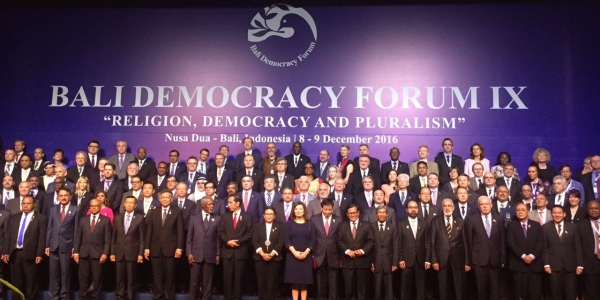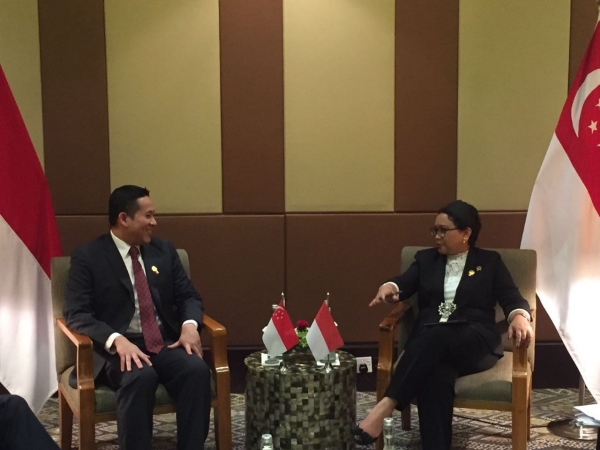

Parliamentary Secretary (Ministry of Home Affairs) Amrin Amin attended the 9th Bali Democracy Forum (BDF) today. The BDF, which was initiated by Indonesia in 2008, is an annual forum on the development of democracy in Asia.
In line with this year’s theme of “Religion, Democracy and Pluralism”, Parliamentary Secretary Amrin delivered a statement on Singapore’s experience in fostering racial and religious harmony during the General Debate of the BDF. The text of Parliamentary Secretary Amrin’s statement is appended below.
Parliamentary Secretary Amrin met with Indonesian Minister for Foreign Affairs Retno Marsudi on the sidelines of the BDF. Parliamentary Secretary Amrin and Retno reaffirmed the close ties between Singapore and Indonesia, and discussed ways to strengthen our bilateral relationship, including in the area of counter-terrorism cooperation. Parliamentary Secretary Amrin also met Malaysian Deputy Minister for Foreign Affairs Dato’ Sri Reezal Merican before departing for Singapore.
. . . . .
MINISTRY OF FOREIGN AFFAIRS
SINGAPORE
8 DECEMBER 2016
--
STATEMENT BY PARLIAMENTARY SECRETARY (MINISTRY OF HOME AFFAIRS) AMRIN AMIN AT THE NINTH BALI DEMOCRACY FORUM, 8 DECEMBER 2016
Your Excellency Retno Marsudi
Excellencies
1 Very good morning. It’s an honour to be here today at the Ninth Bali Democracy Forum. Let me first express Singapore’s deepest condolences on the devastating earthquake. Our hearts and prayers are with the affected victims and families. Let me also express my appreciation to Foreign Minister Retno Marsudi and Indonesia for their gracious hospitality and excellent organisation of this event. Indonesia plays a very important role in the region’s growth, stability and success, and this Forum is a good example of the constructive initiatives that have been developed under Indonesia’s leadership.
2 Singapore and Indonesia share a common interest in preserving and promoting the values of racial and religious unity and pluralism in our societies. These values are at the very core of Indonesian statehood and society, enshrined in Indonesia’s constitution, and in the twin concepts of Pancasila and Bhinneka Tunggal Ika, or Unity in Diversity. President Joko Widodo himself has been a strong advocate and has been tirelessly promoting the importance of inter-religious unity in Indonesia.
3 Pluralism is also at the heart of Singapore’s society. Our founding fathers decided early on that all Singaporeans had to be given an equal opportunity to succeed, regardless of race, language or religion. They worked to build a meritocratic society, and nurtured it through government policies designed to integrate our various communities, while respecting each community’s distinctiveness. For example, in our public housing estates, which house over 80% of Singaporeans, we have ensured a balanced mix of races in each block and neighbourhood. Singaporeans from different backgrounds live in harmony beside one another, shop in the same markets, and have their children study together in government schools and play together in common playgrounds. These deliberate measures promote mutual understanding between people of diverse backgrounds.
4 Religion and democracy serve as the foundations of peace and tolerance, and help to create an environment for healthy debate. However, religion and democracy can also be distorted in ways that undermine diversity. One example is the rise of religious extremism, which is seen by many as a key driving force of the transnational threat of terrorism today. Terror attacks inflict suffering indiscriminately, regardless of the victims’ race or religion, and breed mistrust among communities.
5 It is important for sensible and credible voices to continue to speak up against the misuse of religion and democracy, not just at international fora but also at the grassroots level. We should continue to strengthen the role played by such positive voices in our communities. In doing so, we must first understand the nature of the threat, and that terrorists’ ultimate aim is to sow fear and create divisions. This alienates specific groups from their communities and allows extremists to recruit the disenfranchised. By this measure, terrorism has already succeeded in some areas. There are frequent reports of intolerance around the world, and such incidents only add to the isolation of certain groups, and fuel extremist tendencies.
6 Second, we must preserve mutual respect between people of different races and religions and we cannot afford to legitimise discrimination and bigotry in the name of democratic free speech. Insults and humiliation ostensibly aimed against extremists often end up inflicted upon the entire Muslim community. In Singapore, we will not allow distorted concepts of democratic and political rights to be used as an excuse for spreading hate and intolerance among our ethnic and religious groups.
7 Third, we should create suitable frameworks to strengthen social resilience by identifying, rehabilitating and re-integrating disaffected individuals. Singapore, for example, has benefitted from the work of its Religious Rehabilitation Group. This is a network of Islamic scholars and teachers who volunteer to rehabilitate those who have become radicalised by extremist ideologies. Such processes can help to correct misconceptions of religion, and thereby foster tolerance and social resilience in our communities.
8 Singapore continues to update its policies to foster an inclusive and tolerant society. We recently launched the SGSecure movement to sensitise Singaporeans to the importance of preventing threats arising from terrorism, extremism, and religious or racial strife. Its main aim is to ensure Singaporeans “Stay Alert, Stay United and Stay Strong”. We recognise that while the government can promote religious unity, society must ultimately take ownership of fostering trust and inclusiveness. It is our peoples who play a key role in keeping our countries safe, secure and resilient.
9 No country has all the solutions to the challenges we discussed today. We must therefore work together to tackle terrorism and extremism at the operational and ideological levels. I am pleased to note that Singapore and Indonesia have excellent cooperation on this front, and Singapore supports the key leadership role that Indonesia plays in securing peace and stability in the region.
10 This year’s theme of “Religion, Democracy and Pluralism” is a very timely one. The compatibility of these three elements will always be much clearer in theory than in practice. But as governments, communities and individuals, it is our responsibility to find that balance.
11 I wish this Forum every success and look forward to the discussions ahead. Thank you.